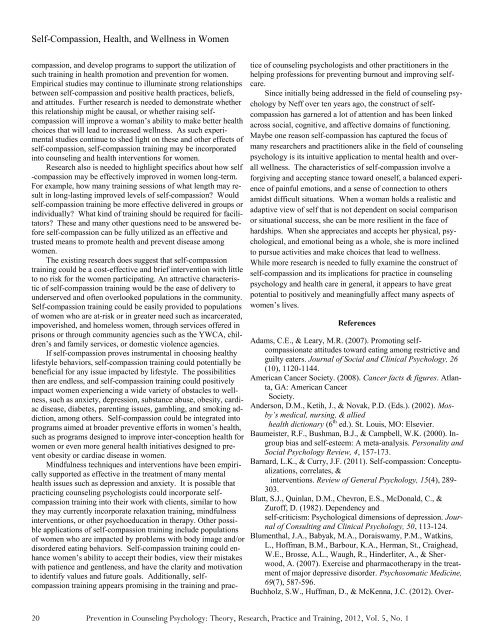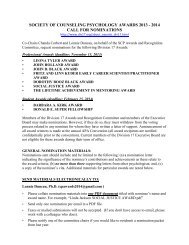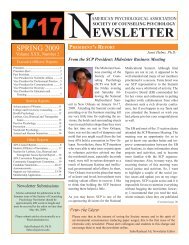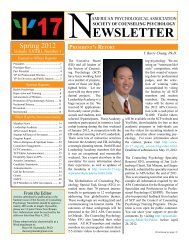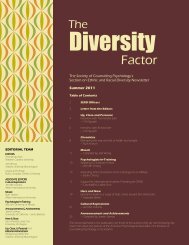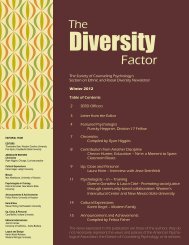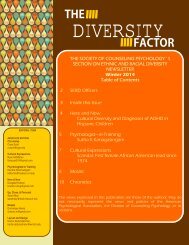PREVENTION IN COUNSELING PSYCHOLOGY: - ResearchGate
PREVENTION IN COUNSELING PSYCHOLOGY: - ResearchGate
PREVENTION IN COUNSELING PSYCHOLOGY: - ResearchGate
You also want an ePaper? Increase the reach of your titles
YUMPU automatically turns print PDFs into web optimized ePapers that Google loves.
Self-Compassion, Health, and Wellness in Women<br />
compassion, and develop programs to support the utilization of<br />
such training in health promotion and prevention for women.<br />
Empirical studies may continue to illuminate strong relationships<br />
between self-compassion and positive health practices, beliefs,<br />
and attitudes. Further research is needed to demonstrate whether<br />
this relationship might be causal, or whether raising selfcompassion<br />
will improve a woman’s ability to make better health<br />
choices that will lead to increased wellness. As such experimental<br />
studies continue to shed light on these and other effects of<br />
self-compassion, self-compassion training may be incorporated<br />
into counseling and health interventions for women.<br />
Research also is needed to highlight specifics about how self<br />
-compassion may be effectively improved in women long-term.<br />
For example, how many training sessions of what length may result<br />
in long-lasting improved levels of self-compassion? Would<br />
self-compassion training be more effective delivered in groups or<br />
individually? What kind of training should be required for facilitators?<br />
These and many other questions need to be answered before<br />
self-compassion can be fully utilized as an effective and<br />
trusted means to promote health and prevent disease among<br />
women.<br />
The existing research does suggest that self-compassion<br />
training could be a cost-effective and brief intervention with little<br />
to no risk for the women participating. An attractive characteristic<br />
of self-compassion training would be the ease of delivery to<br />
underserved and often overlooked populations in the community.<br />
Self-compassion training could be easily provided to populations<br />
of women who are at-risk or in greater need such as incarcerated,<br />
impoverished, and homeless women, through services offered in<br />
prisons or through community agencies such as the YWCA, children’s<br />
and family services, or domestic violence agencies.<br />
If self-compassion proves instrumental in choosing healthy<br />
lifestyle behaviors, self-compassion training could potentially be<br />
beneficial for any issue impacted by lifestyle. The possibilities<br />
then are endless, and self-compassion training could positively<br />
impact women experiencing a wide variety of obstacles to wellness,<br />
such as anxiety, depression, substance abuse, obesity, cardiac<br />
disease, diabetes, parenting issues, gambling, and smoking addiction,<br />
among others. Self-compassion could be integrated into<br />
programs aimed at broader preventive efforts in women’s health,<br />
such as programs designed to improve inter-conception health for<br />
women or even more general health initiatives designed to prevent<br />
obesity or cardiac disease in women.<br />
Mindfulness techniques and interventions have been empirically<br />
supported as effective in the treatment of many mental<br />
health issues such as depression and anxiety. It is possible that<br />
practicing counseling psychologists could incorporate selfcompassion<br />
training into their work with clients, similar to how<br />
they may currently incorporate relaxation training, mindfulness<br />
interventions, or other psychoeducation in therapy. Other possible<br />
applications of self-compassion training include populations<br />
of women who are impacted by problems with body image and/or<br />
disordered eating behaviors. Self-compassion training could enhance<br />
women’s ability to accept their bodies, view their mistakes<br />
with patience and gentleness, and have the clarity and motivation<br />
to identify values and future goals. Additionally, selfcompassion<br />
training appears promising in the training and practice<br />
of counseling psychologists and other practitioners in the<br />
helping professions for preventing burnout and improving selfcare.<br />
Since initially being addressed in the field of counseling psychology<br />
by Neff over ten years ago, the construct of selfcompassion<br />
has garnered a lot of attention and has been linked<br />
across social, cognitive, and affective domains of functioning.<br />
Maybe one reason self-compassion has captured the focus of<br />
many researchers and practitioners alike in the field of counseling<br />
psychology is its intuitive application to mental health and overall<br />
wellness. The characteristics of self-compassion involve a<br />
forgiving and accepting stance toward oneself, a balanced experience<br />
of painful emotions, and a sense of connection to others<br />
amidst difficult situations. When a woman holds a realistic and<br />
adaptive view of self that is not dependent on social comparison<br />
or situational success, she can be more resilient in the face of<br />
hardships. When she appreciates and accepts her physical, psychological,<br />
and emotional being as a whole, she is more inclined<br />
to pursue activities and make choices that lead to wellness.<br />
While more research is needed to fully examine the construct of<br />
self-compassion and its implications for practice in counseling<br />
psychology and health care in general, it appears to have great<br />
potential to positively and meaningfully affect many aspects of<br />
women’s lives.<br />
References<br />
Adams, C.E., & Leary, M.R. (2007). Promoting selfcompassionate<br />
attitudes toward eating among restrictive and<br />
guilty eaters. Journal of Social and Clinical Psychology, 26<br />
(10), 1120-1144.<br />
American Cancer Society. (2008). Cancer facts & figures. Atlanta,<br />
GA: American Cancer<br />
Society.<br />
Anderson, D.M., Ketih, J., & Novak, P.D. (Eds.). (2002). Mosby’s<br />
medical, nursing, & allied<br />
health dictionary (6 th ed.). St. Louis, MO: Elsevier.<br />
Baumeister, R.F., Bushman, B.J., & Campbell, W.K. (2000). Ingroup<br />
bias and self-esteem: A meta-analysis. Personality and<br />
Social Psychology Review, 4, 157-173.<br />
Barnard, L.K., & Curry, J.F. (2011). Self-compassion: Conceptualizations,<br />
correlates, &<br />
interventions. Review of General Psychology, 15(4), 289-<br />
303.<br />
Blatt, S.J., Quinlan, D.M., Chevron, E.S., McDonald, C., &<br />
Zuroff, D. (1982). Dependency and<br />
self-criticism: Psychological dimensions of depression. Journal<br />
of Consulting and Clinical Psychology, 50, 113-124.<br />
Blumenthal, J.A., Babyak, M.A., Doraiswamy, P.M., Watkins,<br />
L., Hoffman, B.M., Barbour, K.A., Herman, St., Craighead,<br />
W.E., Brosse, A.L., Waugh, R., Hinderliter, A., & Sherwood,<br />
A. (2007). Exercise and pharmacotherapy in the treatment<br />
of major depressive disorder. Psychosomatic Medicine,<br />
69(7), 587-596.<br />
Buchholz, S.W., Huffman, D., & McKenna, J.C. (2012). Over-<br />
20 Prevention in Counseling Psychology: Theory, Research, Practice and Training, 2012, Vol. 5, No. 1


